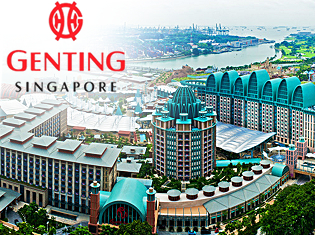 Casino operator Genting Singapore’s results took a hit in Q4 2013 after VIP gamblers went on a hot streak at the Resorts World Sentosa (RWS) integrated resort casino. Overall revenue fell 13% to S$693m (US $548m), while gaming revenue took a 19% tumble to S$509m ($402m), more than twice the 8.2% decline experienced in the same quarter by RWS’ crosstown rival Marina Bay Sands, who also blamed VIP luck for the downturn. The VIP decline was sufficient to override RWS’ gains in premium mass wagering.
Casino operator Genting Singapore’s results took a hit in Q4 2013 after VIP gamblers went on a hot streak at the Resorts World Sentosa (RWS) integrated resort casino. Overall revenue fell 13% to S$693m (US $548m), while gaming revenue took a 19% tumble to S$509m ($402m), more than twice the 8.2% decline experienced in the same quarter by RWS’ crosstown rival Marina Bay Sands, who also blamed VIP luck for the downturn. The VIP decline was sufficient to override RWS’ gains in premium mass wagering.
Despite the revenue shortfall, Genting Singapore’s profit rose 5% to S$170m due to decreased expenses, a 62% reduction in tax paid and a 12% rise in non-gaming revenue to S$184m. The non-gaming attractions at RWS drew 20k daily average visitors, up from 18k in Q3, while its hotel rooms enjoyed 92% occupancy.
For 2013 as a whole, group revenue fell 3% to S$2.85b ($2.25b), or about 4/5 of the total gaming revenue earned by all Atlantic City casinos last year. Gaming revenue fell 8% to S$2.2b while non-gaming revenue rose 18% to S$660m. Group profit rose 4% to S$708m. Looking ahead, Genting Singapore says it will boost its marketing to drive foreign visitation, which could dilute its future yield, as could rising labor costs.
CONSULTANT TELLS SINGAPORE TO RESTRICT ONLINE GAMBLING OPTIONS
As Singapore prepares to introduce a regulated online gambling market, a European consultant has told the nation’s Institute of Policy Studies that their best course of action would be restricting online licenses to two or three major operators and to limit the types of wagering these operators are allowed to offer punters. In November, Singapore’s Home Affairs office suggested legislation was on the way to ban online gambling not sanctioned by the government.
CK Consulting’s Christian Kalb has been hired by local sports lottery operator Singapore Pools to assist in its diversification into the online realm. The Straits Times reported that Kalb suggested European tactics such as IP-blocking, advertising curbs and impeding payment processing would prove 90% effective in preventing Singaporeans from patronizing unauthorized sites. Kalb believes a “practical” IP-blocking scheme should target the sector’s top 50 operators and not bother too much about the minnows of the online gambling world. Singapore’s online gambling market is believed to have been worth S$370m in 2012 and enjoying 6% annual growth.





